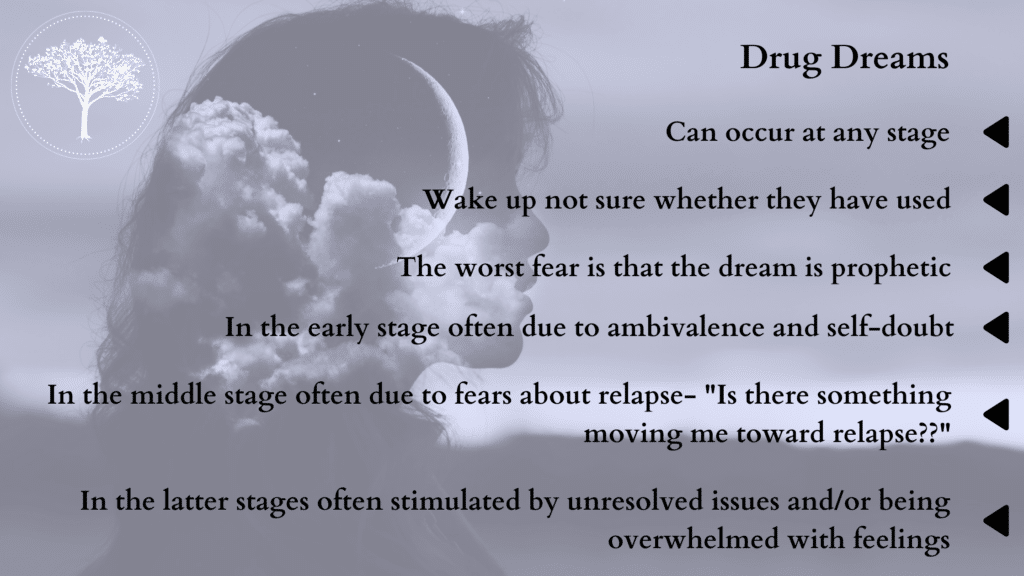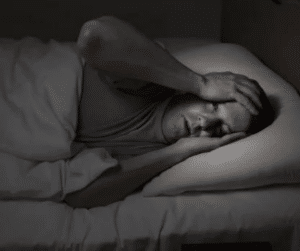Early recovery comes with a lot of physical baggage that results from years of abusing substances. Even after being successfully detoxed at a medical facility, many times the patient suffers from various withdrawal symptoms known as post-acute withdrawal symptoms, or PAWS, for weeks or even months following. Drug dreams are no different. While not necessarily a physical correlation to the cessation of substance abuse, drug dreams tend to be more of a mental symptom of withdrawal. As with any habit or addiction, it is partially physically and partially emotionally based. Many recovering addicts newly in recovery are bombarded with drug dreams in the beginning and are completely blindsided by the arrival of this not-so-welcome addition to his or her lives. Dealing with drug dreams can be challenging, but it is possible to overcome.
Coping Strategies for Drug Dreams in Recovery
Every night when we sleep, we dream. Dreams are the images created by our subconscious mind during the REM phase of sleep. Many experts believe that our dreams are directly influenced by the encounters and the emotions we experience during our waking hours. It should come as no surprise that many newly recovering people experience what is known as drug dreams, or dreams in which the recovering addict is using or around drugs and/or alcohol. These dreams are often extremely vivid and can leave the individual confused or truly believing he or she has used them even after waking. This is a completely normal portion of the recovery process, especially in the beginning, and should not be a source of shame or fear. However, the dangers posed by drug dreams are very real nonetheless, and it is extremely important for a person newly in recovery to know how to handle drug dreams and the resulting feelings that stem from them.
Take Control of Your Recovery Journey

Navigating Drug Dreams in Recovery
The first thing you should do after awakening from a drug dream is to bring yourself back into reality. The vividness of the dream may have seemed completely real, but it is important to recognize it for what it was: a dream. Much like waking up from a nightmare as a child, remind yourself that it’s not real. Many people report feelings of shame or guilt after having a drug dream, feeling as though it is somehow his or her fault that he or she is dreaming about using. It is impossible to control the subconscious mind. It is not that you are not doing enough for your recovery or that you’re failing in any way, it happens to the best of us. Even people with years of sobriety report having drug dreams on occasion. Do not beat yourself up. A drug dream itself is not a relapse.
Many people who have drug dreams fail to report them to any sort of support system out of fear of judgment or ridicule. A great method for battling drug dreams is by being open and honest about them with the people in your support system, such as fellow recovering addicts or your sponsor. By sharing your struggles with others, they can actively offer their own experiences and advice on the matter, as well as reassure you that everything will be okay. Remaining open and honest is a key element in recovery, and since drug dreams typically occur more often in early recovery, it is healthy to begin to practice this level of openness with your support system from the very beginning.

Understanding the science behind drug dreams
The science behind drug dreams is still not fully understood, but researchers have made significant progress in unraveling their mysteries. It is believed that drug dreams are a result of the brain’s attempt to process and make sense of the experiences, emotions, and memories associated with drug use or the fear of drug use. These dreams often occur during rapid eye movement (REM) sleep, which is the stage of sleep when most vivid dreaming occurs.
During REM sleep, the brain’s activity increases, and it is thought to be closely related to emotional processing. This is why drug dreams can be emotionally intense, as they tap into deep-seated fears, desires, and memories. In some cases, drug dreams can even trigger a physical response, such as an increased heart rate or sweating, further highlighting the powerful connection between the mind and body.
Interpreting drug-related dreams: What do they mean?
Interpreting drug-related dreams requires a careful analysis of the symbols present and an understanding of personal associations. It is essential to consider the context of the dream, the emotions experienced, and any personal experiences or beliefs related to drug use. While there is no one-size-fits-all interpretation for drug-related dreams, there are some general themes that can provide guidance:
- Exploring desires and cravings: Drug-related dreams can be a manifestation of unfulfilled desires or cravings. They may indicate a longing for excitement, escape, or altered states of consciousness.
- Processing emotions and experiences: Dreams serve as a way for our minds to process emotions and experiences that may be difficult to confront in our waking life. Drug-related dreams can provide a safe space to explore and understand these emotions.
- Uncovering subconscious thoughts: Drug-related dreams can offer a glimpse into our subconscious thoughts and desires. They may reveal hidden fears, insecurities, or unresolved conflicts that need attention and resolution.
Common symbols in drug-related dreams
Drug-related dreams often contain a multitude of symbols that can be deciphered to uncover their hidden messages. These symbols can vary depending on personal experiences, cultural influences, and individual associations. However, there are some common symbols that frequently appear in drug-related dreams. These include:
1. Substances: The specific drug or substance featured in the dream can hold symbolic meaning. For example, marijuana may represent relaxation or escapism, while cocaine may symbolize ambition or a desire for control.
2. Paraphernalia: Drug-related dreams may include objects such as pipes, needles, or rolling papers. These objects can represent the rituals, habits, or associations surrounding drug use.
3. Settings: The environment in which the dream takes place can provide valuable insights. A dark and chaotic setting may signify inner turmoil, while a serene and beautiful landscape may represent a desire for tranquility.
4. Emotions: Paying attention to the emotions experienced within the dream is crucial for interpretation. Feelings of euphoria or anxiety can reflect aspects of our waking life and provide clues to our emotional state.
The role of therapy in addressing drug dreams and mental health
Therapy can play a vital role in addressing drug dreams and promoting overall mental well-being. By working with a therapist, individuals can gain a deeper understanding of the underlying meaning and significance of their drug dreams. Therapy provides a safe space for exploring the emotions, memories, and fears that may be driving these dreams, allowing for healing and personal growth.
In therapy, individuals can learn coping strategies to manage the emotional impact of drug dreams, develop healthier thought patterns, and build resilience. Therapists may also incorporate techniques such as dream analysis, imagery rehearsal therapy, or trauma-focused therapies to address specific concerns related to drug dreams and mental health.
Your Path to Recovery Begins Here
Promoting overall mental well-being to reduce drug dreams
Taking proactive steps to promote overall mental well-being can help reduce the frequency and intensity of drug dreams. Here are some strategies to consider:
1. Self-care: Engage in regular self-care activities that promote relaxation, stress reduction, and emotional well-being. This can include activities such as exercise, mindfulness practices, hobbies, or spending time in nature.
2. Healthy sleep habits: Prioritize healthy sleep habits by establishing a consistent sleep schedule, creating a relaxing bedtime routine, and creating a comfortable sleep environment. Avoiding stimulants such as caffeine or electronic screens close to bedtime can also contribute to better sleep quality.
3. Support networks: Cultivate a supportive network of friends, family, or support groups who understand and can provide encouragement during challenging times. Having individuals to lean on can make a significant difference in managing drug dreams and mental health concerns.
Techniques for exploring and understanding drug-related dreams
Exploring and understanding drug-related dreams can be a personal and transformative journey. Here are some techniques that can help in the interpretation process:
1. Journaling: Keeping a dream journal can be an effective way to record and analyze your dreams. Write down the details of your drug-related dreams, including symbols, emotions, and any personal associations. Over time, patterns may emerge that provide deeper insights.
2. Self-reflection and introspection: Take the time to reflect on the symbols and emotions within your drug-related dreams. Consider how they relate to your waking life and any unresolved issues or desires you may have. Self-reflection can help uncover the hidden meanings behind the dream symbols.
3. Seeking guidance from experts: If you find that your drug-related dreams continue to trouble or confuse you, consider seeking guidance from professionals specializing in dream interpretation or therapy. They can provide valuable insights and help you navigate the complexities of your dreams.









